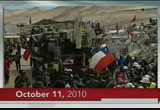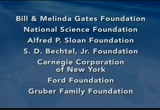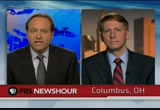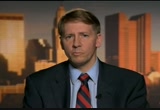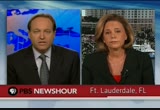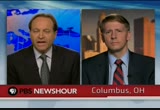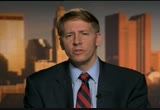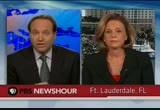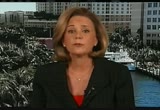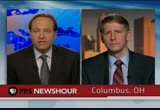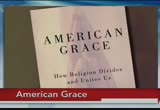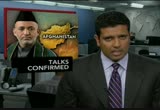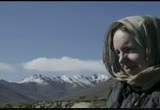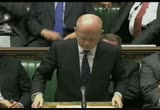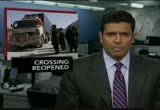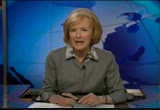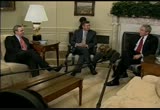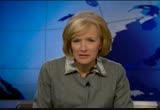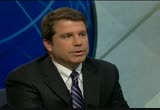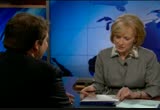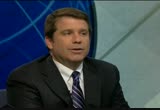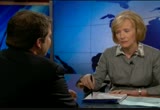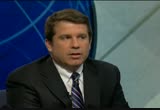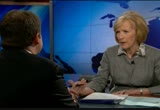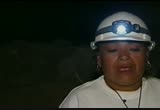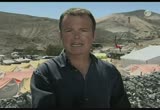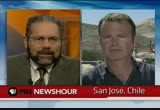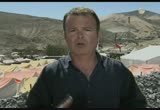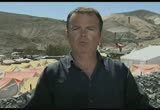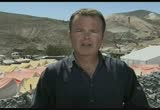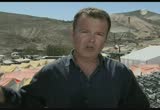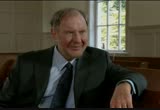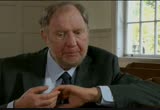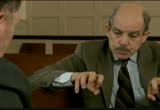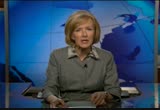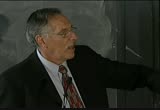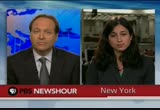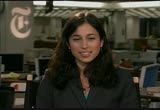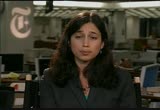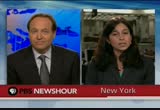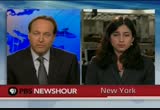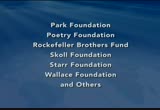tv PBS News Hour PBS October 11, 2010 6:00pm-7:00pm EDT
6:00 pm
captioning sponsored by macneil/lehrer productions >> woodruff: good evening. i'm judy woodruff. the securities industry said today a nationwide ban on home foreclosures would be "catastrophic" for the united states. >> brown: and i'm jeffrey brown. on the newshour tonight, ohio attorney general richard cordray and florida real estate lawyer and author shari olefson assess the depths of the growing crisis, and measures to tackle it. >> woodruff: then, political advertising analyst evan tracey looks at how undisclosed sources of money are affecting the 2010 elections. >> brown: jonathan miller of
6:01 pm
independent television news has the latest from chile on the imminent rescue attempt of those trapped miners. reyou can never describe this as a risk-free operation. everyone is on tender hooks, tense, nervous, and i'm sure very stressed. >> woodruff: paul solman talks to political scientist robert putnam about religion in america, the subject of his new book, "american grace." >> brown: and we speak to catherine rampell of the "new york times" about the winners of this year's nobel prize for economics. >> woodruff: that's all ahead on tonight's newshour. major funding for the pbs newshour has been provided by:
6:03 pm
this program was made possible by the corporation for public broadcasting. and by contributions to your pbs station from viewers like you. thank you. >> brown: talk of a nationwide moratorium on selling foreclosed homes ran into new opposition today, as the securities industry warned against serious damage to the housing market. the warning came from a securities industry and financial markets association. it said imposing a moratorium would be, quote, catastrophic. last week bank of america, the nation's largest, acted on its own to halt foreclosures in all 50 states. the bank is an underwriter of the newshour. three other banks, allied financial, j.p. morgan chase, and pnc financial, have imposed partial freezes in 23
6:04 pm
states where foreclosures must be approved by a judge. all of the banks acted after allegations of improprieties including so-called robo- signings in which processors signed documents they never read. on friday senate majority leader harry read called for a federally mandated moratorium. congressman debbie wasserman shultz of florida joined the call on sunday. >> i think we need a combination of a freeze potentially and also we need to sit down with the banking industry and talk to them about ways in which we can help them be able to work those mortgages out because it's absolutely imperative that we keep people in their homes. >> brown: some republicans including house minority whip eric cantor say a moratorium would do far more harm than good. >> what you're telling people and institutions that lend money is they do not have the protection to take the risk they need to to extend credit so people can get a mortgage. you're going to shut down the housing industry if that's the case.
6:05 pm
government.... >> eric, you are not from.... >> ...intervening. >> brown: also this weekend white house senior advisor david axelrod voiced his own doubts. >> i'm not sure about a national moratorium because there are, in fact, valid foreclosures that probably should go forward. and where the documentation and paperwork is proper. >> brown: in the meantime attorneys general in as many as 40 states are expectd to announce a joint investigation of foreclosures this week. one of the attorneys general looking into this, richard cordray of ohio, joins us now. last week his office filed suit against gmac mortgage and its parent, ally financial, accusing the companies of filing fraudulent documents in hundreds of foreclosures. mr. cordray is a democrat. he's currently running for reelection. also with us is shari olefson, a real estate lawyer in florida, and author of "foreclosure nation: mortgaging the american dream." she represents banks in commercial foreclosures. richard cordray, i'll start with you. before we talk about a
6:06 pm
possible moratorium, how serious is this? what kind of direct impact are you seeing on people in ohio? >> it's a serious problem. it needs to be taken seriously by the financial industry. you cannot have people's private property rights being taken in the courts of this country based on case after case in which fraudulent evidence is being presented to the court. i mean, nobody can defend that. that's not an appropriate practice. we want to see that that is cleaned up. we don't want to see foreclosures where it's based on phony evidence that can't stand up to court scrutiny. >> brown: do you know yet whether-- i know it's early and you're still looking into this. but do you know whether and how many people might have been foreclosed on who perhaps shouldn't have been? is that what we're talking about? >> we don't know at this point. i am not asking to reopen transactions that have already occurred. if people have already left those homes and the property may have been sold to innocent third partys, i don't know that it's appropriate to unwind transactions. we want to be measured in our approach.
6:07 pm
i also do not necessarily favor a blanket moratorium on foreclosures. what we do think is if foreclosures are going forward based on fraudulent evidence, those should not go forward. there should be a pause and there should be a cleaning up of that process. but foreclosures had that are proper can go forward and should go forward. >> brown: shari olefson, what's your reading about the seriousness and causes of the problem at this point? >> well, it could be very serious, jeffrey, because obviously consumer confidencex÷ has been one. biggest problems in our real estate market. we saw what happened at the beginning of this crisis with all the inter-connectedness of in terms of the market and reaching to wall street and to main street. we can only guess what some of the impacts of a more permanent foreclosure freeze might be for the country. in terms of the volume here, i mean it's a huge bucket. we're also including though a lot of foreclosures that are being properly done. we're just sort of double checking to see that the procedure has been done right. >> brown: staying with you,
6:08 pm
shari olefson, you think a moratorium or a freeze a probably not a good idea at this point? what is the argument against it? >> well, it's just too big of a bucket to be looking at the whole entire nation. there are a lot of other foreclosure companies, foreclosure attorneys and a lot other banks that have been following the procedure. you know, the shame in this is that unfortunately for a lot of americans this is their only contact they'll have with our legal system. it really is not sending a good message. clearly to have attorneys are officers of the court not following the rules of the court is reprehensible especially when people are losing their homes. on the other hand, we can't hold up everyone. i mean when we had the problem with toyota with their brake system we didn't stop the manufacturing of all cars. we need to figure out a way to weed out these bad apples and correct the problem, punish the people who need to be punished which is exactly what the attorney general is seeking to do and move forward and get these foreclosures out of our system so we can return to a more normal market. >> brown: mr. richard cordray,
6:09 pm
you spoke of a pause in the process now. what does that mean? how extensive would that be and how would it work? >> actually i very much agree with what shari just said. if foreclosures are based on proper evidence, they should go forward. if foreclosures are based on fraudulent affidavits, nobody can defend that. if that were done in any other kind of case both the party and the attorney would expect severe sanctions. i think the courts are going to have to sort this out here. we're at the beginning of our inquiry not at the middle or the end. we're going to have to see where the evidence leads us. if this is a widespread practice, those foreclosures need to be paused and cleaned up before anything can go forward. you cannot have court judgments being given on fraudulent evidence. i think everybody can agree on that. >> brown: in the meantime, how do we proceed right now with foreclosures that are sitting there to go forward or not to go forward? >> i would say two things. first of all the more immediate cooperation and back and forth sharing of
6:10 pm
information we get from the lenders and the mortgage services, the quicker we'll be able to get to the bottom and get it sorted out. if financial institution knows that they have filed foreclosure actions and they have submitted fraudulent evidence in those cases, it would be well worth their while to sit down and think about how they can work those cases out, reach a resolution and have mitigation to keep people in their hopes rather than seeking a court order where the court may have to sanction them and they may be facing severe exposure. so i think that it's up to the lending institutions as bank of america has done to recognize they have issues in their process, to sit down, work with the law enforcement agencies across this country, and see if we can get this sorted out quickly so that the courts can move forward. >> brown: shari olefson, one of the arguments for a pause or even for a moratorium is just how can you continue with these... with a process like this if it seems so tainted right now, if there are really hundreds of thousands of cases out there where we don't
6:11 pm
really even know whether it was a legal process. how can you continue? >> we don't. we don't know. cleaning up is what they're doing right now which is why it's stopped. you know, there are other elements that are forcing these foreclosure firms that have been improperly handling these affidavits to clean up. namely the industry itself. the title insurance underwriters will not ensure these transactions anymore. with or without attorney general investigations or, you know, foreclosure freezes and mandatory moratoriums from washington, the industry is frozen anyway because the title insurance underwriters have said no on each of these transactions before we should ensure title again you need to reforeclose or show to us that these affidavits were properly filed. in addition new lenders won't loan on the properties now. in a way it's sort of policing itself. >> brown: are you worried in the meantime that the market is frozen? i mean you're in a state where there is a lot of foreclosed homes on the market, right? so in the meantime, does
6:12 pm
everything stop? >> it's horrendous what's happening now. there are buyers who are waiting to buy homes who are being told that they can't close for at least another 90 days. even these foreclosure factories. i mean we have to remember with this entire crisis no matter how thin you slice a situation there's always two sides. so these foreclosure factories that were doing these wrong things not everyone there was doing wrong things. there were good, honest workers who were just trying to support their families. they've been let go. hundreds of people are losing their jobs because of that. the repercussions are significant. on the flip side an interesting silver lining which i always like to try to find in these crease he's, is the fact that those people who have homes for sale that are not related to the foreclosure crisis may find it easier to sell their homes because a lot of the supply that is out there in terms of the distress is just no longer available to be purchased for now. >> brown: finally, how concerned are you going forward here about the impact of this on the housing market
6:13 pm
itself and home prices and sales that may or may not happen in your state and around the country? >> i'm concerned. that's why we're going to have an investigation. i don't want to jump the gun on that. we'll see what the evidence shows. the quicker we get information shared back and forth the quicker we'll get a sense of the total picture. what's disturbing is there appears to have been a business model followed by some not necessarily all in which fraud was a basis for seeking orders from the court. that cannot stand. that cannot be permitted. the a.g.s didn't create this issue. the title insurance company didn't create it. mortgage services who filed phony affidavits in case after case have created it. we now have to work together to see how quickly we can clean it up and make sure that the court orders that are given are based on appropriate, sound evidence and not based on fraud. >> brown: richard cordray and shari olefson, thank you both very much. >> thank you. >> you're welcome. >> woodruff: still to come on >> woodruff: still to come on the newshour, money in political advertising; the rescue
6:14 pm
operation in chile; religion in america; and the nobel prize for economics. but first, the other news of the day. here's hari sreenivasan in our newsroom. >> sreenivasan: the latest economic forecast today provided little hope for a surge in growth. the national association of business economics surveyed 46 experts. they predicted only slight improvements through 2011. that was not enough to give much spark to wall street. the dow jones industrial average gained 3 points to close at 11,010. the nasdaq rose a fraction of a point to close at 2402. more than 58 million americans will go another year without an increase in social security benefits. the government will announce this week that inflation is so low, there is no need for a cost-of-living adjustment. it's the second year in a row without an increase. afghan president hamid karzai confirmed today his government has been talking with taliban leaders for "quite some time." he said they were "unofficial contacts," and not formal negotiations. in berlin, germany, the u.s. representative to afghanistan and pakistan, richard holbrooke, said the u.s. is aware of the
6:15 pm
contacts. >> we're not involved in those talks but we support them, provided they follow the red lines. that are absolutely critical. because we have a strategic interest here. anyone deciding to rejoin the political system in afghanistan has to renounce al qaeda, lay down their arms and participate in the constitution of the country. >> sreenivasan: the fighting in afghanistan continued without letup over the weekend. roadside bombs killed two more nato troops. that made 26 killed so far in october. nato launched an investigation today into the death of british aid worker linda norgrove in afghanistan. she was killed friday, 13 days after being abducted by militants. we have a report from jonathan rugman of independent television news. >> reporter: linda norgrove was 36 when she died during an attempt by american special forces to rescue her. at first the americans claimed a hostage-taker had killed her
6:16 pm
by blowing himself up. but today an even more awful truth began to emerge. a grim-faced prime minister delaying this press conference until he had told linda's grieving father that her rescuers may have been the ones who killed her. >> general petraeus has since told me that review has revealed evidence to indicate that linda may not have died at the hands of her captors as originally believed. that evidence and subsequent interviews with the personnel involved suggest that linda could have died as a result of a grenade detonated by the task force during the assault. >> reporter: today the foreign secretary said the aide worker's captors had links with al qaeda but there was no credible on option for a negotiated release. he defended the americans saying they had shielded ten afghan women and children during the rescue attempt. >> certainly the initial reading, the initial viewing of the various videos that were taken during this action
6:17 pm
suggested that it was an explosion caused by the hostage-takers that had cost linda norgrove her life. it was on a second viewing by different personnel that it appeared there was another possibility. >> reporter: the british aide worker was traveling in a two- car convoy when she and three afghan colleagues were kidnapped. one of the kidnapped afghans told us taliban militants had moved them from a house to a hideout high in the mountains. afghan police told channel 4 news they had been negotiating linda's release and that a rescue attempt was a bad idea because just over a week ago linda's afghan colleagues were set free after local elders intervened. tonight a british security source said the u.k. was closely involved in the joint operation with the americans, that it was a joint decision to rescue linda norgrove. our assumption was that the captors would kill her, he
6:18 pm
said. >> sreenivasan: in neighboring pakistan, trucks moved back and forth once again on a major supply route into afghanistan. the crossing was reopened sunday after 11 days. pakistan had closed it when a u.s. helicopter strike killed two border guards. that led to taliban attacks on scores of trucks hauling nato supplies. israeli prime minister benjamin netanyahu offered today to renew a freeze on settlement construction in the west bank. in exchange, he said the palestinians must recognize israel as a jewish state. palestinian officials swiftly rejected the offer. they said it would deny the rights of arabs living in israel and refugees who want to return. the celebrated opera star joan sutherland died early sunday at her home in geneva, switzerland. the australian-born soprano was acclaimed worldwide for her vocal range and control. in 2004, she was one of the recipients of the kennedy center honors, for outstanding achievement throughout a career that spanned four decades. joan sutherland was 83 years old. those are some of the day's major stories. now, back to judy. >> woodruff: with a little more
6:19 pm
than three weeks left until election day, democrats are taking at least one new approach to try and close the enthusiasm gap with republicans. president obama and other democratic party leaders have been hammering away at the undisclosed money being spent by outside interest groups on tv ads this election season. at a rally in philadelphia yesterday, the president called the trend a threat to our democracy. >> don't let them hijack your agenda. the american people deserve to know who is trying to sway their election. you can't stand by and let special interests drown out the voices of the american people. >> woodruff: the main targets of democrats' criticism have been the conservative political entity american cross roads. its nonprofit affiliate cross roads g.p.s. and the u.s. chamber of commerce. the cross roads groups, co-founded by former bush political advisors karl rove and ed gillespie, have pledged
6:20 pm
to spend upwards of $50 million on behalf of republican candidates this fall. the chamber meanwhile has vowed to dole out $75 million on the midterm. the democratic national committee released an ad this weekend accusing the groups of using donations from foreigners on campaign ads. >> it appears they even taken secret foreign money to influence our elections. it's incredible republicans benefiting from secret foreign money. tell the bush crowd and the chamber of commerce stop stealing our democracy. >> woodruff: in an appearance yesterday on fox news sunday karl rove denounced the charges. >> they have not one shred of evidence to back up that baseless lie. this is a desperate and i think disturbing trend by the president of the united states to tar his political adversaries with some kind of enemy's list being unrestrained by any fact or evidence whatsoever. >> woodruff: but democrats would not relent.
6:21 pm
despite the "new york times" reporting saturday that, quote, a closer examination shows that there is little evidence that what the chamber does in collecting overseas dues is improper or even unusual. white house advisor david axelrod was pressed on the matter by host bob schieffer of cbs news "face the nation." >> this part about foreign money, that appears to be peanuts, mr. axelrod. i mean, do you have any evidence that it's anything other than peanuts? >> well, do you have any evidence that it's not, bob? the fact is that the chamber has asserted that but they won't release any information about where their campaign money the coming from. that's at the core of the problem here. >> woodruff: separately polls show that when voters are asked what issues are uppermost in their mind heading into this year's election, the economy and jobs are named most frequently. the matter of campaign spending is seldom, if ever, raised.
6:22 pm
>> woodruff: third-party groups on both sides of the political aisle are spending big on advertising this fall, though not at the same rate. republican-backed outside groups have spent some $46 million on tv ads on congressional races in the past two months, compared with just $7 million by interest groups backed by democrats. to make sense of the numbers, we're joined by evan tracey, founder of the campaign media analysis group, which tracks political advertising. evan tracey, good to have you back with us again. >> great to be here. how are you. >> woodruff: very well. good to see you. but this is such a diversity, disparity. $46 million on the part of conservative.t and republican outside groups versus $7 million on the part of democratic groups. is this consistent with what we've seen in the past? >> well, it's interesting because when you sort of look at the recent history of campaign finance, it used to be that the parties were the big purveyors of what used to be called soft money. it was fairly equal.
6:23 pm
after mccain feingold the democrats took a strong edge with the 527s and those groups that were basically backed by the labor unions but now post citizens united you see the republicans have gotten back in the game in a big way in a really out-spending the democrats in these key congressional senate races not just in the amount of money they're spending but in the scope and coverage of races that they're sitting. >> woodruff: post citizens united. you're referring to the supreme court decision that said it was all right for a corporate interest and private interest. >> right. that's the one that sort of the latest rule change which... it changed how the money gets in and the timing of when these campaigns and these groups can spend it. >> woodruff: now, what are these groups spending their money on? you track advertising. is all of this money going into television? >> the majority of the republican money right now is going into television. it's not just regular tv ads. it's negative ads. about 90% of all these ads right now have been negative ads so they're adding an awful lot of help both on the message side for campaigns but also on the other side.
6:24 pm
>> woodruff: speaking of negative ads. let's look at a couple. this is an ad run by american cross roads. this is a conservative group. they ran it against and have been running it against robin karenahan who is running for the senate in the state of missouri. >> robin carnahan. the reviews are in. false, phony, misleading. robin carnahan co- starring in an obama pelosi production winner best fiction for saying that her opponent received the most from lobbyist. that's not true. she should know better. robin carnahan. too dishonest, too liberal. two thumbs down. >> woodruff: how typical of that is that of other cross roads ads? >> very typical. the one thank that cross roads has done is basically operated like a party. they've been mostly in senate races and a lot of their ads are either reinforcing themes that are already in the race.
6:25 pm
you hear a lot about obama and pelosi. you're also seeing that in a number of other senate races. what they're also doing is helping roy blunt the republican in that race by introducing basically counterattack ads. they're being helpful in both the amount of money but also in the messages that they're able to run. >> woodruff: and the spending that they're doing in these states, evan, how does it compare to what the candidates themselves are spend something. >> certainly in some cases you're seeing the groups spending more than candidates right now. you're seeing this a lot in the house races especially with republican groups sometimes are the only ones on the air. one of the things these groups are doing is filling in the gaps because democrats have more money as a party right now. they have more money because they have more incumbents. one of the things that this money is is really doing is starting to fill in and almost be a bridge loan for some of these candidates that are challengers and don't haves much money as incumbents. it's a big help. >> woodruff: let's look at the democratic side. this is the democratic-leaning outside group move-on dot-org. this is an ad they ran against
6:26 pm
rand paul in the state of kentucky for the senate. >> they say you can judge a person by the company they need. rand paul is getting hundreds of thousands of dollars worth of help from the chamber of commerce, a group recently accused of tax fraud for diverting money meant for charity toward their partisan agenda. tax breaks for the wealthy, denying americans better health care and cut jobs for teachers and first responders all no benefit their millionaire friends on wall street. if rand paul is on their side, do you think he'd be on yours? >> woodruff: how similar is that ad to other ads? >> you know, what's interesting about that is there's not that many of these groups right now doing much work for these democrat senate candidates right now. here's one example. but again they're talking about the chamber. in other words, it's very process oriented the message right now. i think you're seeing that a lot from democrats this fall. they're really trying to focus on process, campaign finance, and having a hare time kind of linking this back into policy. it certainly helps in a race
6:27 pm
like kentucky which will be very close to have this outside money coming to their aid but there's really not a lot of examples of this for democrats right now in these senate and house races. >> woodruff: in other words, around the country you're not seeing a consistent theme everywhere? >> no. that's the thing. with the republican groups it's very consistent. they're trying to find new ways to say obama and pelosi. the democrat groups are trying to find issues they can exploit in individual races. just on the senate republican groups have run ads in 18 different senate races this year democrats in nine. in the house, republicans have been in over 60 races. democrats in just over 6 right now. so you're really not seeing the groups do very much work for democrats in these house and senate races. >> woodruff: quickly, evan, you were telling me in the governors' races there's a little more parity. >> much different story when you look at governors' races. a lot more democratic groups active in spending. that is very much in parity to how the republican groups are spending in some of these close governors' races coming up this fall. >> woodruff: finally, your
6:28 pm
take on this... the democratic complaint about non-disclosed donors contributing to these outside groups on the republican side. >> it's the rules. almost like in a basketball game where you see the coaches working the referees, this is what the democrats are trying to do. they're trying to work the referees, in this case that's the media and the voters in hopes they'll get a foul call a little bit closer to election day. >> woodruff: that dnc ad we saw earlier we may never see. >> again the timing of that was really for the sunday shows and to get that in, we haven't seen it paid for and aired anywhere. now again it's a holiday weekend so we might start seeing that come tuesday, wednesday. so far again they're really trying to play up the process right now and kind of staying away from some of the policy issues. >> woodruff: we in the news media tend to pick those things up. >> well, that's for you to say, judy. >> woodruff: all right. evan tracey, thanks very much. >> great to be here, thanks. >> brown: freedom for 33 trapped chilean miners inched ever closer with news the evacuation is set to begin tuesday at midnight.
6:29 pm
today rescuers finished installing steel tubing to reinforce the top of a shaft that will bring the miners to the surface. we begin our coverage with a report from garent vincent of independent television news. >> reporter: as the drill which has created the miners' escape routes left camp hope on the day when their families were finally told when the rescue attempt would start, there was one woman who made a point of thanking each member of the team. maria has been here every day of the miners' confinement because her brother dario is one of the 33. "i'm so happy," she told me. "i'm thrilled. it's the news we've been waiting for." i walked with maria in a now diffused mine where as children she and her brother used to play. about 100 meters in we came to a spot where part of the mine had collapsed. "sometimes when the mining companies think they found the rich seam, "maria told me,"
6:30 pm
they carve too much out of the mountain and take away strength. that's why the san jose mine collapsed, because of greed." further down and out of the darkness there appeared one of the steel shelters that the miners are trained to run to should the roof and the walls start to cave in. maria is explaining to me the supplies, the emergency kit that the miners would have in a rescue like this which she says is very similar to the one in the san jose mine. there's supply food in here and medicine in that little box. i have to say i've been if here a few minutes. it's very unsettling feeling. who knows what it must be like to be stuck in a place like this for 65, 66, 67 days. maria told me that her brother knew the mine was insecure, and he was about to quit his job. but he needed the money.
6:31 pm
she keeps a photo of him next to the camp hope i.d.-card she wears around her neck. you must be proud of him. the mining families here think of the mountains as being very much alive. maria told me that she believes the san jose mountain was angry, and that's why it trapped dario inside. there may be just one more day to wait now before it lets him return to the light. >> brown: for more on the progress and risks involved, ray suarez talked this afternoon to jonathan miller, another itn reporter on the scene at the san jose mine. >> suarez: jonathan, what's been going on between the completion of the drilling and the beginning of the operation to extract the men? >> well, the main thing has been putting in these big, thick steel casing pipes into the top of the rescue shaft. this has now been completed successfully. they've had cameras going
6:32 pm
right down inside inspecting it. that's been monitord up on the surface. geologists have given it the all-clear. the little capsule, the phoenix rescue capsule itself shaped like a bullet has been up and down inside successfully. they've had it right down to 610 meters. that's 2,000 feet down inside. only 40 meters or 30 feet i should say short of the actual chamber itself. and they're very happy with it. one of the things they've discovered i should add is that when they bring it back up again because of the twists and turns in the tunnel, the capsule rotates or spirals up. they've expecting it to go the full 360 degrees at least 10 or 12 times on the way to the surface. the miners have been advised to keep their eyes shut on the way up although that may be because they want to protect their eyes from the sunlight above. the miners, of course, inside will be in full radio-telephone contact with the surface. >> suarez: are there physical risks for the men?
6:33 pm
what do you have to be careful about as you bring them up from half a mile under the surface after more than nine weeks? >> well, you know, you can never describe this as a risk- free operation. everyone is on tender hooks, tense, nervous, and i'm sure very stresseded. however, the relatives all say that they're happy that this whole operation is in the hands of real professionals. i have talked to some of them today, including the chief rescue medic. now, he told me that december spite reports of physical and mental ailments among some of the men he considers those pretty minimal. he thinks they're in reasonably good shape to come up. they will... they have been doing about two weeks of quite intense cardiovascular training and muscle exercises and all of the vital signs of the men down below have been monitord by medics on the surface. this has allowed them to draw up a list of the order of ascent. this will also be done, of
6:34 pm
course, on not just physical and mental fitness but on age and experience but that order list has been drawn up. it can be changed at any point, of course, when the... i think they've sending down a special forces naval commando down inside first along with a paramedic. they will select the men and bring them up. i think they'll probably, you know, be in pretty rough shape when they emerge, but at this stage they're pretty confident that they're in a fit state to be brought up. >> suarez: how long is it expected to take once they begin to bring them up, to bring up each individual miner to the surface and then to rescue all 33? >> well, it's long. it's going to take about 25 minutes they reckon to pull them out. i mean it could be a little less than that but the turn- around time that they're going to expect to average putting the capsule down, getting the men prepared strapped in with their harnesses into the equipment, all of that, and
6:35 pm
then bringing them up. the turn-around time will be about an hour. it's 3 miners and then two shifts or pairs of paramedics and commandos going down as well. that will be 37 men. 37 hours. in the early hours of wednesday morning they'll start. it won't be over until well into thursday. now the last man out is is apparently going to be the foreman of the shift. he's been in charge down below. although coming up from a position which has been completed over by the men. the health minister of chile has said that they're all wanting to be the last man out. he said that this was a completely admirable show of solidarity. however, up here there are suspicions that the reason that they're all competing for this is they want to be the man whose name goes into the guiness book of records as the miner trapped longest underground. >> suarez: no miner has ever been trapped underground for this length of time. do we really know what twas
6:36 pm
faces them physically, psychologically once they reach the surface? >> i met the chief psycho therapist the other day. i talkd to him long and hard about this. it is clear they have been through a really intense experience. there is the possibility of post traumatic stress. however, he feels that by and large they've managed to cope very, very well with the situation. i've got to say i took a trip a couple of days ago into another nearby copper mine. we went right down into the depths, into the bowels of this mountain 350 meters below. that's only half as deep as the guys here at the san jose mine are. but down there, the air is muggy. it's 30 degrees centigrade. it's really airless and very dusty.zl certainly in the first 17 days of complete darkness, that must have been a terrifying thing. down there when you switch off the lights the darkness is absolute. you cannot see anything.
6:37 pm
in the first 17 days after the collapse it took a long time, i think five or six days for the dust to settle down. so their lungs will be all mucked up as well. they'll be in pretty rough shape. >> suarez: jonathan miller joining us from the san pedro mine in chile. thanks a lot. >> sure thing, ray. you're welcome. >> woodruff: now, newshour economics correspondent paul solman explores the religious diversity of this country. he talks to the co-author of a new book on religion in america. >> reporter: for the past six years harvard public policy professor robert putnam along with notre dame's david campbell has been studying religion in america. the result is american grace. 3,000 americans interviewed twice, congregations visited, conclusions drawn, many of them surprising. we met up with putnam at a quaker meeting house near his home and office in cambridge,
6:38 pm
massachusetts. bob putnam, welcome. >> thank you, paul. >> reporter: for you what were the major discoveries the ahas? >> well there were a couple. the first is that american... america is a very religious country. we've been able to show that that religion in some respects has highly favorable aspects for american democracy. if you look across the whole world you can see that religion taken in high doses is toxic. most places that are devout and diverse also have a high index of mayhem, bosnia, beirut or bomb bay. how can we be both religious and diverse and also tolerant? >> reporter: what's the answer? >> aunt susan. all americans have an aunt susan. aunt susan is someone you know in your extended family. she's jewish and you're baptist or she's none and your mormon or whatever. you know that your faith says
6:39 pm
sadly aunt susan is not going to heaven because she's not in the right religion. come on. it's aunt susan. you know if anybody is going to heaven it's aunt susan. she's made for hefern. all americans are caught in this dilemma that we know what we say on sunday morning. i'm the way, the truth and the light. my way or the highway. but we know aunt susan. >> reporter: but there are no aunt susans in bosnia, beirut, bell fast, bomb bay. >> not many. the marriage rate between catholics and protestants in northern ireland is roughly 8 to 10%. that is roughly 8 to 10... in the united states it's 50%. so we're much much more likely to be married to people who are in a different faith. >> reporter: how much more religious are people here in america than people in other countries which have achieved the same economic level of development. >> we're way more religious than most other advanceded countries. the average level of church attendance in the united states, for example, is a little bit of controversy but probably about 0 or 40% a
6:40 pm
week. roughly something like that. in england it's 5%. the average american is more religiously observant and rng is more important in their life than for the average iranian. so america is a more religious country. i don't mean we're a theocracy. but we're more religious at the grass root levels than countries that look devout like iran. >> reporter: why? >> i think the most common explanation is in a way our religious diversity. that is right from the founding of america, we've had no church, no official state church. that's why the pilgrims came here. all sorts of religions have flourished here in this country because there's not a state monopoly. of religion. and americans have been incredibly inventive in religious terms. we've invented more religions
6:41 pm
actually in the last 200 years than any place else in the world. mormonism, for example. some of them have flourished as mormonism has. >> reporter: we were so religiously tolerant. why? >> initially we were tolerant because we had to be. there were so many different religions here in this, on this continent, that no one religion was powerful enough to impose itself on everything else. but what's happened, as i say, in the most recent 50-year period is we've actually begun to live with one another, to sleep with one another, to love one another across religious lines its not warm hands and be tolerant. it's "i know aunt susan." it becomes very hard to demonize someone or demonize a whole religion if you know people in it. in our research actually from a scientific point of view because we interviewed people twice, we could watch them change and we could watch people who didn't initially look so tolerant get a new
6:42 pm
friend who was mormon or who was jewish or who was evangelical. we can see their attitudes soften not only toward that religion, the religion of their new friend but towards all religions. >> reporter: that's the good news. is there bad news? >> yeah. it used to be in the 1950s that most americans were kind of in a moderate not very intense religious middle. we've moved toward the extremes of being either very religious-- this is the sort of evangelical protestant part of the religious spectrum-- or very non-religious. this is the more secular not really atheist. almost no americans say that they're atheist. but they're certainly not churched. that's something true for younger people. >> reporter: how many people are atheists in america? >> almost nobody. among our 3,000 people we had two people who when we asked them what they were religiously said they were atheist or agnostic.
6:43 pm
i don't mean that every american believes in god but the term atheist is not one in common currency. >> reporter: but we have extreme religious polarization in this country. the pastor in florida who was going to burn the koran. >> right. it's true that there's a higher level of intolerance toward muslims in america. part of that may be, you know, bound up with this so-called war on terrorism. but most of it actually is not... i'm sure it's not driven by that actually. the reason i know is because in our survey we asked about how people felt about building a buddhist temple. buddhists are really very peaceful people. there have been no buddhists going around blowing up buildings or whatever. yet americans feel just as negative about buddhists as they do about muslims. that suggests to me that it's the strangeness its the esotericness of buddism and islam that are mostly responsible for the fact that americans feel or express negative views. >> reporter: aren't you concerned that within
6:44 pm
religions as groups of people become more fervent, american jews, some of them, american christians certainly muslims in other parts of the world, that that raises the level of danger? >> yeah, i am concerned about religious polarization although i'm much more concerned about political polarization. indeed one of the things we find is that americans nowadays are making their religious affiliations in part on the basis of their political affiliations. in other words it's not the religious polarization. the underlying polarization is quite terrible political polarization. that's what i'm most deeply worried about. how we can have a civil adult conversation among people of different political backgrounds. religion is part of that story but i don't think religion is the driver. i think the driver is in the field of politics. >> reporter: robert putnam, thanks. >> thank you very much, paul. >> woodruff: a programming note.
6:45 pm
later this evening, most pbs stations will air the first of a three-part look at how religious ideas have shaped the public life of this country. from the producers of "frontline" and "the american experience" comes "god in america," a six-hour documentary airing over the next three nights. >> brown: finally tonight, the 2010 nobel prize for economics. it was awarded today to two americans, peter diamond of m.i.t. and dale mortensen of northwestern university, and to christopher pissarides, a british-cypriot economist. diamond got the news as he returned home to the boston area from an overseas trip. >> fortunately i was sitting down i wasn't behind the steering wheel. it kind of takes your breath away. it's just... you suddenly realize not only is it the
6:46 pm
moment but also there are all sorts of changes in your life, opportunities opening up, all sorts of things that are going to be different. >> brown: diamond and his colleagues were recognized for research into why markets often don't work as expected, particularly the job market. joining us to explain is catherine rampell of the "new york times." catherine, the economist won for work in so-called search theory. can you give us the lehman's definition of that. >> right. basically that refers to research about markets where buyers and sellers don't automatically find each other. that really refers to almost all markets except for things like commodities. so in the job market that means why does it take so long for people who are unemployed to find jobs even when there are job openings available? >> all right. so that's a particularly relevant question right now. tell us what the research suggests about the situation as these economists studied it
6:47 pm
but also as it applies to what we're looking at now? >> basically they were interested in, again, why does it take so long for people to be matched to jobs? their conclusion had a lot to do with the fact that people are not inter-changeable units. different people have different skills. they have different weaknesses. they have different strengths. jobs for that matter are also not identical cookie-cutter things. so what happens is it takes time for the right person to be matched to the right job. and beyond that, there are government policies that at times can make the search process less efficient. so what we're talking about what's going on now a lot of that has to do with the demand picture but it can also have are to do with the fact that it takes time for people to be matched to the right job because they're unwilling to move if their house is underwater, for example. >> brown: explain for the lehman, why is that a sort of aha? that is as opposed to what economic theory should tell us about matching people to jobs?
6:48 pm
>> i know. it sounds pretty imbue tiff, right? back in the '70s it was actually quite controversial in part because there was the idea that markets were efficient, that, you know, why doesn't the wage just drop so that a company sees new-hires more attractive and a person who is unemployed will just take the job? because they need the job. what happened was around the time of the '70s there was this more expansive, more nuanced thinking about the fact that markets where goods are not totally inter-changeable-- in this case goods are people-- means different things. how do you sort of characterize what takes so long? how are people different? how does the fact that when people get discouraged about finding a job affect the likelihood of their being placed in a job? a lot of what's interesting about this research is just that it sort of expanded what people thought about when they thought about economics and how to think about the job market. but beyond that, it's also
6:49 pm
been... the same types of principles have been applied to the housing market, to finance, to marriage, to all sorts of different things. >> brown: now are their applications or implications for government policy in all of this? >> there are a few. well, i mean there's been a lot of research especially more recently. but one of the key points from these three researchers' work is that sometimes government policies can have unintended consequences. the big example that a lot of, i'm sure, anti-stimulus people would like to cite is unemployment benefits. unemployment benefits are given for many different reasons including compassion. wu one effect of that is at least at the margin if you're paid not to work, then that means you have a slightly less incentive to go out and find a job. that's the kind of policy that we're talking about. >> brown: as you say that's been... excuse me. as you say, that's been part of the discussion we've been having on this program and in the debate in washington.
6:50 pm
>> absolutely. but that's not the only thing that their work touches on. i had the opportunity to listen in on or talk with or listen in on a press conference or talk with each of the winners today. all of them were asked about what the implications of their work was for current policy. at least two of of the three strongly emphasize the fact that we really want people to be put back to work as quickly as possible because the longer they're out of the labor force, the harder it is to get them back to work. they become detached from work. their skills might deteriorate. they might be stigmatized. all sorts of bad things can happen. they talk about how their work has this basically shows that the longer you're apart from the labor force the sort of more entrenched that undercurrent of unemployment becomes. this is one of the problems that europe faced, let's say, in the '70s and '80s where they had this underclass of chronically unemployed people.
6:51 pm
>> brown: before i let you go, there is an interesting side bar to all this. one perhaps best known of the winners is peter diamond. he's been nominated to be on the federal reserve board, right? >> absolutely. i'm sure that this is a happy day for him on many levels. but one particularly ironic level i guess is that he was nominated back in april. his nomination was effectively blocked by the republicans in the senate in part because some republicans, including richard shelby, had said that he was too inexperienced, that they didn't want someone on the fed who was, quote, learning on the job. you know, this is a nice little comeuppance i'm sure for professor diamond today to be able to say, yeah, you know, i have some credentials under my belt. actually i was renominated a couple of weeks ago. there is an implication that this little plaudit on his resume might help him more smoothly get to the confirmation"'ujtt::ñ
6:52 pm
>> brown: i they he said this is almost as good as 2004 when the red sox finally won the world series. >> he's a big red sox fan. he threw out the opening pitch a couple months ago i think. >> brown: bigger than i knew. catherine rampell of the "new york times," thank you very much. >> thank you. >> woodruff: again, the other major developments of the day. a major securities industry group warned a nationwide ban on home foreclosures would be "catastrophic" for the economy. hospital officials in atlanta announced the first attempt to treat a person in a stem cell study. the partially paralyzeded patient received injections of millions of embryonic stem cells. to hariri in the news room for what's on the newshour online. >> sreenivasan: the influence of outside ad spending in this year's midterm races and ray suarez writes on the run-down blog about this week's pbs series god in america and what it says about how religion
6:53 pm
connects to our shared political lives. all that and more on our website newshour.pbs.org. >> woodruff: and again to our >. and again, to our honor roll of american service personnel killed in the iraq and afghanistan conflicts. we add them as their deaths are made official and photographs become available. here, in silence, are eight more.
6:54 pm
>> woodruff: and that's the newshour for tonight. on tuesday, we'll look at a case before the supreme court which challenges whether federal law protects children's vaccine makers from liability lawsuits. i'm judy woodruff. >> brown: a small correction before you go. jonathan miller was at the san jose mine in chile, not the city of san jose. i'm geoffrey brown. we'll see you online and again here tomorrow evening when we'll try to get everything perfectly right. thank you and good night.
6:56 pm
359 Views
IN COLLECTIONS
WMPT (PBS) Television Archive
Television Archive  Television Archive News Search Service
Television Archive News Search Service 
Uploaded by TV Archive on

 Live Music Archive
Live Music Archive Librivox Free Audio
Librivox Free Audio Metropolitan Museum
Metropolitan Museum Cleveland Museum of Art
Cleveland Museum of Art Internet Arcade
Internet Arcade Console Living Room
Console Living Room Books to Borrow
Books to Borrow Open Library
Open Library TV News
TV News Understanding 9/11
Understanding 9/11
